The Project Gutenberg EBook of The Nursery, June 1873, Vol. XIII., by Various
This eBook is for the use of anyone anywhere at no cost and with
almost no restrictions whatsoever. You may copy it, give it away or
re-use it under the terms of the Project Gutenberg License included
with this eBook or online at www.gutenberg.org
Title: The Nursery, June 1873, Vol. XIII.
A Monthly Magazine for Youngest People
Author: Various
Release Date: January 31, 2008 [EBook #24479]
Language: English
Character set encoding: ISO-8859-1
*** START OF THIS PROJECT GUTENBERG EBOOK THE NURSERY, JUNE 1873, VOL. XIII. ***
Produced by Emmy, Juliet Sutherland and the Online
Distributed Proofreading Team at http://www.pgdp.net

| IN PROSE. | |
| PAGE. | |
| The Children at Grandmother's | 161 |
| The Flying Wood-Sawyer | 163 |
| Papa's Story | 167 |
| About Bees | 171 |
| Bad Luck | 174 |
| Cherry and Fair Star | 176 |
| About some Indians | 181 |
| Playing Tableaux | 183 |
| Little Mischief | 186 |
IN VERSE. | |
| PAGE. | |
| The Old Blind Man and his Granddaughter | 165 |
| Dixie | 169 |
| The Fat Little Piggies | 178 |
| A Song of Noses | 180 |
| A-Maying | 185 |
| The Seasons | 188 |
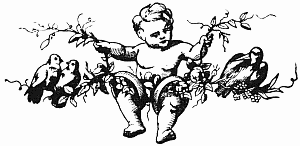
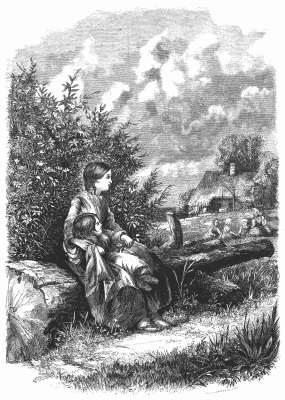 THE CHILDREN AT GRANDMOTHER'S.
THE CHILDREN AT GRANDMOTHER'S.

One fair day in June, the boys went down to the sea-beach to bathe, and the girls went out on the lawn to play. Some of them thought they would play "hunt the slipper."
But little Emma Darton, who was a cousin to the rest, said, "I promised my mother I would not sit down on the grass: so, if you play 'hunt the slipper,' I must not play with you; for in that game you have to sit."
Then her Cousin Julia replied, "Nonsense, Emma! It is a bright warm day. Don't you see the grass is quite dry? Come, you must not act and talk like an old woman of sixty. Come and join in our game."
But Emma said, "When I make a promise, I always try to keep it. If to do that is to be like an old woman of sixty, then I am glad I am like one."
"You are the oldest-talking little witch I ever knew for a five-year-old," cried Julia. "If you don't look out, you'll not live half your days."
"I think Emma is right," said Marian, another cousin. "So, if you insist on sitting on the grass, Emma and I will go and sit by ourselves on the trunk of the old fallen tree."
But Julia insisted on having her game of "hunt the slipper;" and Emma and Marian went and sat down on the fallen trunk, and looked on while the rest played.[163]
The next day five of grandmother's little visitors did not seem to be well. Some were coughing, and some were sneezing, and some were complaining of pains in their limbs.
"Why, what is the matter with you, children?" said the old lady. "If I did not know you were sensible little girls, I should say you had been sitting on the damp grass,—all of you but Emma and Marian."
The cousins looked at one another; but no one spoke aloud. Then Marian whispered to Emma, "Are you not glad you kept your promise to your mother?"
Emma looked up and smiled, but did not say a word.
One day last winter I was cutting maple-logs in the woods with a cross-cut saw. It was about five feet long, and had a handle at each end, so as to be used by two persons together. My brother generally helped me; but, for some reason, he was not with me then, and I was at work all by myself in a rather lonesome place.
I had finished eating my dinner, set my pail under a clump of trees, and commenced my afternoon job; but, as the log was large and hard, I often had to stop and rest a minute. While I was standing still, with my hands upon one handle of the saw, all at once a bird came flying down towards me; and, after resting upon the ground behind the log a few moments, what do you suppose he did?
Whether he knew I was tired, and thought it was too hard for me to cut the wood all alone, I cannot say; but suddenly he gave a little spring, and seated himself right on the other[164] handle of my saw, as you see in the picture, grasping it with all the hands he had, and looking as though he had come on purpose to help me saw that log through.
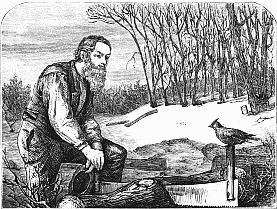
For my part, I rather think he did help me; for, while he kept his hold upon the other end of the saw, I rested faster than I ever did before. I stood as motionless as a statue; for I feared that any movement would scare the bird away.
How soon I should have got through my sawing with his help, I cannot tell. But suddenly he seemed to think of something more important; and away he went, like a streak of sunshine, off into the woods beyond me.
I have never seen my sawyer-bird since then. I call him my "sawyer-bird" because I don't know how else to name him. He was a strange bird to me: but he seemed like a good friend; and I shall always remember him as he looked when trying to help me work that winter's day.
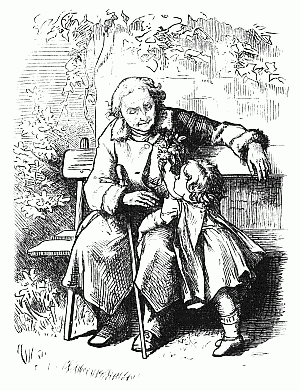
"Now, papa, for another army story," said little Eddie, as he climbed into papa's lap, and prepared himself to listen.
Papa closed his eyes, stroked his whiskers; and Eddie knew the story was coming. This is it,—
One day, when we were camping in Virginia, some of us got leave to go into the woods for chestnuts, which grew there in great abundance. We were busy picking up the nuts, when we heard a scrambling in the bushes. We thought it was a dog.
"Was it a dog?" asks Eddie.
"No, it was not a dog."
"Was it a cat?"
"No, it was not a cat."
"O papa! was it a bear?"[167]
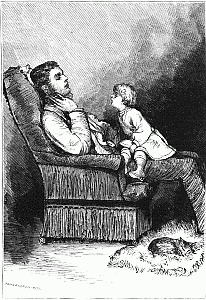
"No, it was not a bear."
"Do tell me what it was!"
"Well, let me go on with my story, and you shall hear."
It was a fox. How he did run when he saw us! We ran after him, and chased him into a pile of rails, in one corner of the camp.
You see, the soldiers had torn down all the fences, and piled them up for fire-wood. The fox ran right in among the rails; and, the more he tried to get out, the more he couldn't.
"A fox, a fox!" we shouted; hearing which, all the men, like so many boys, rushed up, and made themselves into a circle around the wood-pile, so that poor foxy was completely hemmed in.[168]
Then a few of us went to work, and removed the rails one by one, until at last he was clear, and we could all see him. With a bound, he tried to get away; but the men kept their legs very close together, and he was a prisoner. We got one of the tent-ropes and tried to tie him.
Such a time as we had! One man got bitten; but after a while foxy was caught. Then what did the cunning little thing do but make believe he was dead! Foxes are very cunning: they can play dead at any time.
He lay on the ground quite still, while he was tied, and the rope was made fast to a tree. When we all stepped back, he tried again to get away. The rope held him fast; but he bit so nearly through it, that we feared we should lose him, after all.
So off rushed one of the boys, and borrowed a chain from one of the wagons at headquarters. With this Master Fox was made quite secure.
We tried to tame him; for, being away from all little children, we were glad of any thing to pet. But it was of no use; for, even when foxes are taken very young, they cannot be tamed. They do not attach themselves to men, as dogs and some other animals do. He would not play with us at all; but we enjoyed watching him, as we had not many amusements.
One day we had to go off on a march, and left our little fox tied to a tree. When we came back, he was gone. We never knew how he got away; but we were not very sorry, for he was not happy with us. It was much better for him to be in the woods with his own friends. If he was smart enough to stay there, he may be living now; but he must be a pretty old fox by this time.
Here papa stopped; and his little boy drew a long breath, as though very glad that the little fox got into the woods again.
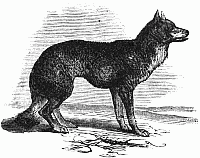

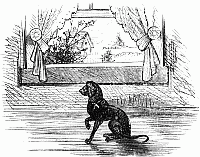
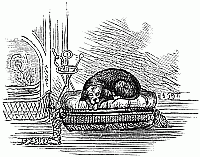
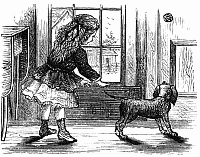
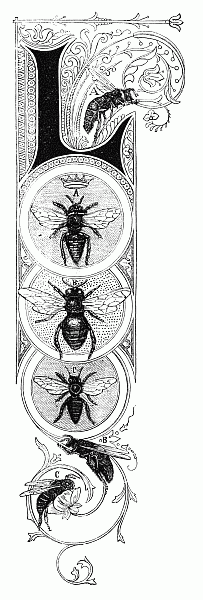
So, the first fine day, we walked to a neighboring village, and found the bee-master, as he was called, very glad to show us his little pets. He first led us to a hive made wholly of glass, so that we might watch the bees at their labors.
He told us there were three kinds of bees; and in the picture you may see how they look, both when flying and when at rest. Those marked A are queen-bees; B are the male bees, or drones; and C the working-bees.
The most important bee in the hive is naturally the queen. She is longer and sleeker than the others, and has a crooked sting, of which, however, she seldom makes use. Similar in form, but smaller, are the working-bees, whose sting is straight. The male bee, or drone, is thicker than the others, and stingless.
"What has the queen to do in the[172] hive?" I asked. The old gentleman replied, "She is the mother-bee, lays all the eggs, and is so diligent that she often lays twelve hundred in a day, having a separate cell for each egg. That is her only work; for she leaves the whole care of her children to the industrious working-bees, who have various labors to perform. Some of them build cells of wax; others bring in honey on the dust of flowers, called pollen; yet others feed and take care of the young; and a small number act as body-guard to the queen."
The bee-master next took us to a strange-looking old hive, and asked us what it was like. I said, "The trunk of a tree." He told me I was right, and that the wild bees still dwell in hollow trees.
He then showed us various kinds of hives, and, last of all, a glass globe, in which the bees had built a beautiful white comb in the form of a star, and filled it with honey. This he was to send as a wedding-present to a bride.
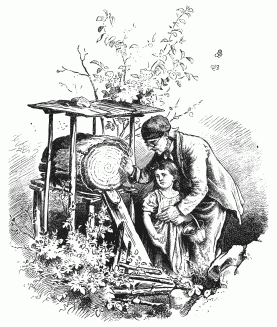
He said, "The bees can make of any egg, either a queen or a working bee, according to the food and treatment they give it. The queen requires but sixteen days in which to come to maturity; while the workers require twenty, and the drones twenty-four. When several queens appear at the same time, they fight until one gains the victory."
Honey is the nectar of flowers, which they collect with their tongues, place in their honey-bags, and deposit in cells built for the purpose, which, when filled, they cover with wax.
Bee-bread is made of the dust of flowers, with which the bee gets covered in collecting honey. This it brushes off, kneads into two little masses, which are placed in a sort of basket on the joint of the leg, where a fringe of hairs acts as a cover.
Wax is a secretion from honey, which oozes out between the rings which form the body, and is then worked with the mouth until it is fit for the construction of the comb. Bees also make a gummy substance for varnishing their cells, which they procure from the buds of trees.
When we took leave of the kind old gentleman, he gave me in a basket a nice honeycomb to take to my mother; and since that my father has bought me a hive of bees. Every summer I plant flowers in my garden for them, that they may not have far to go for their honey.
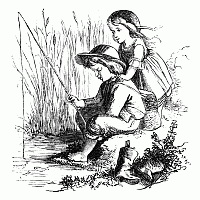
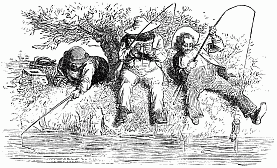
I could not have been quite six years old when I became the possessor of a canary-bird, to which I gave the name of Cherry.
There were three children of us,—myself (the oldest), Arthur, and baby. My father was at sea; and my mother had charge of us all in her little house near the ocean.
Well do I remember one cold day in winter when we were all gathered in the one little apartment that served us for nursery, dining-room, and sitting-room. Arthur, who had overslept himself, was at his breakfast; mother was feeding baby; and I was looking at my dear Cherry in his cage.
Pots of hyacinths in bloom were on the table; Mr. Punch, Arthur's Christmas present, lay as if watching the cat on baby's pillow in the basket; and Muff, the old cat, with Fair-Star her kitten, were lapping milk from a basin on the floor.
My dear mother had taught Muff to be good to Cherry; and Muff seemed to have overcome her natural propensities so far as to let Cherry even light on her head, and there sing a few notes of a song.
So, on the day I am speaking of, I let Cherry out of his cage; and he flew round, and at last lighted on the kitten's head. At this Muff seemed much pleased; and Fair-Star herself was not disturbed by the liberty the little bird took.
But all at once Muff sprang upon Cherry, and, seizing him in her mouth, jumped up on the bureau. At last it would seem as if the old cat had chosen her time to kill and eat my poor little bird.
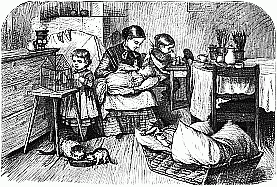
No such thing! Our good Muff was all right. A neighbor, who had come to borrow our axe, had left the back-door open; and a hungry old stray cat had suddenly made her[177] [178] appearance. Muff saw that Cherry was in danger, and seized him so that the strange cat should not harm him.
Cherry was not only not hurt, but not frightened. Well do I remember how my mother placed baby on the pillows, drove out the strange cat, and then took up Muff, and petted and praised her till Muff's purr of pleasure was loud as the noise of a spinning-wheel.
After that adventure, Cherry and Muff and Fair-Star were all better friends than ever.
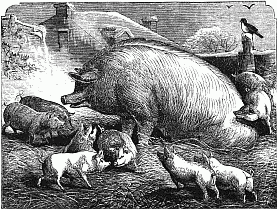
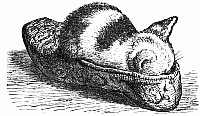

| UNCAN has a nose, Points my finger at it: Has a nose the hare, He will let you pat it. |
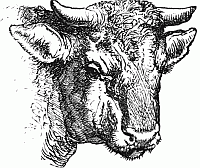
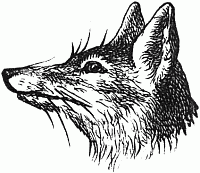
| 
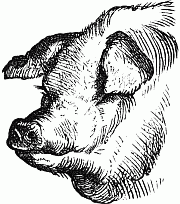
| ||||||||
| |||||||||
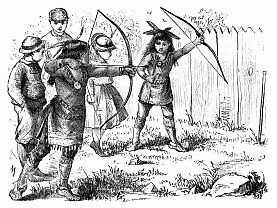
Last summer a party of Indians,—men, women, and children,—in nine little birch canoes, came paddling down the Mississippi River, and landed at our village in Illinois. They were of the Chickasaw tribe from Minnesota, who are half-civilized, and speak our language imperfectly.
Indians, you must know, do not live in good warm houses as we do. They live in wigwams, as they call their houses, which are merely a few poles stuck in the ground, and covered with skins or blankets.
They do not provide regular meals, but live from hand to mouth by hunting and fishing. Sometimes they have to go without food a long time. The men are too lazy to work. They like better to strut about with their faces painted all the colors of the rainbow.
The Indians who came to our village were very good[182] specimens of their race. Of course, their visit made quite a sensation, especially among our young folks. As soon as they landed, the squaws (women) threw their blankets over their shoulders, swung their pappooses (babies) on their backs, and, with their little boys and girls, came up into town.
The Indian boys made some money by shooting arrows at cents stuck in a stake. They were quite skilful. The squaws offered for sale slippers, moccasons, and bags, which they had worked themselves with sinews and porcupine-quills.
Their chief, a large man, whose face was painted bright red, got the use of our town hall, and in the evening gathered his party there, and showed us some of their dances. Two of the men beat a "tum-tum" on their rude drums (which looked like nail-kegs); and the little and big Indians danced or hopped around in a circle, singing, "Ye, ye! yu, yu! hi, yi! ye, ye!"
Now and then the chief would pull out a long knife, and swing it around his head; and another Indian would draw up his bow, as if he were going to shoot. This was the war-dance.
We were all much amused; and our little boys and girls laughed heartily. We gave the Indians some money to buy their breakfast, and they said, "Yank, yank!"
When they, or a like party, come again, I will tell you more about them.
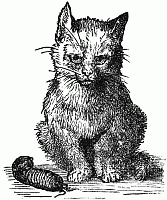
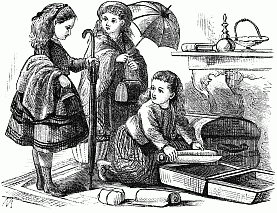
The picture of "Miss Jones" in the February "Nursery" reminded me of two other little girls who are as fond of "playing people" as Edith May.
Nearly every day in winter, when they cannot play out of doors, these little girls dress up to represent different characters. They call this "Playing Tableaux;" but their tableaux are something more than pictures, as they act their parts as well as dress them.
Sometimes, for instance, one of the little girls appears as a peddler, who is quite as hard to get rid of as a real one.
Sometimes a washerwoman comes in, and gets about tubs and clothes, and makes all the confusion of washing-day.
Sometimes papa's great shaggy black coat covers what pretends to be "your good old dog Tiger," who is very kind to his friends, but has loud, fierce "bow-wow-wows" and sharp bites for those who are not good to him.[184]
Sometimes poor little lame Jimmy, who can only walk on crutches, comes in to sell shoe-strings, "because," he says, "you know I can do nothing else to help my poor mother."
Sometimes a ring at the door-bell calls our attention to the wants of a deaf-and-dumb beggar, who makes fearful gestures till he is fed, and then forgets that he cannot speak, and says, "Thank you!" in a very familiar voice.
When these little girls have company, they often fit out travelling parties for California, or a trip to Europe; and the baggage they make out to collect would serve very well if they were "really and truly going," as they tell us they are.
Their good-bys are very affecting as they kiss us all, and beg us write by the first mail.
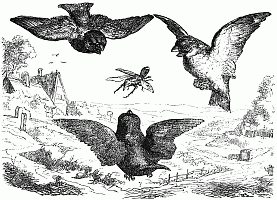 ALL FOR ONE, AND ONE FOR ALL.
ALL FOR ONE, AND ONE FOR ALL.
When the wild March winds were blowing, Not so very long ago, And it still kept snowing, snowing, Piling, drifting, Heaping, sifting, Snow on snow, Faithless Fanny said, "Spring never Will be here; 'twill snow forever; And I don't believe I ever Shall again a-Maying go!" April pleased her little better: Now 'twas rain as well as snow; Every day was wet and wetter, Drifting, dropping, Soaking, sopping, Raining so, That poor Fanny feared the showers Would quite drown her precious flowers; And for what, in May's bright hours, Could she then a-Maying go? Now the gay May sun is shining, Pink and sweet the Mayflowers blow; And forgetting her repining, Her complaining Of the raining And the snow, With its fitful, frosty flurries, Fanny lingers not, nor worries, But to field and greenwood hurries; For she must a-Maying go. Fenno Hayes. |
What now? Will this child never be out of hot water? What is Bessie doing now? I will tell you. She found in one of her mother's drawers a box; and, on opening it, she found some little round things something like sugar-plums.
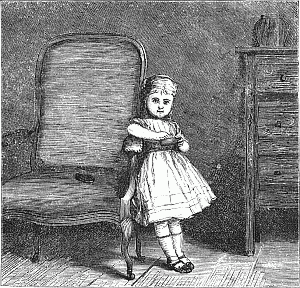
She began putting the little round things in her mouth, and swallowing them. They were not quite so pleasant as she had expected, or she would have taken more. "I wonder what makes them taste so bitter?" thought Bessie.
She will find that out by and by, to her sorrow.[187]
"What makes me feel so?" thought Bessie as she sat in the big arm-chair in mother's best chamber, rubbing her eyes, and feeling very uncomfortable.
She had not sat there long, before she began to cry. Her mother, who had been wondering who could have been meddling with her pill-box, came in. "Have you been swallowing these pills?" she asked.
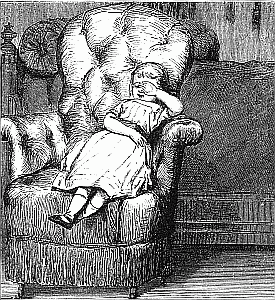
"Yes; but I didn't know they were pills," said Bessie.
"Well, you will be well punished for your fault," said her mother. "The pills will make you quite sick."
And so it happened.[188]
THE SEASONS.
|
This issue was part of an omnibus. The original text for this issue did not include a title page or table of contents. This was taken from the January issue with the "No." added. The original table of contents covered the first six months of 1873. The remaining text of the table of contents can be found in the other issues.
End of Project Gutenberg's The Nursery, June 1873, Vol. XIII., by Various
*** END OF THIS PROJECT GUTENBERG EBOOK THE NURSERY, JUNE 1873, VOL. XIII. ***
***** This file should be named 24479-h.htm or 24479-h.zip *****
This and all associated files of various formats will be found in:
http://www.gutenberg.org/2/4/4/7/24479/
Produced by Emmy, Juliet Sutherland and the Online
Distributed Proofreading Team at http://www.pgdp.net
Updated editions will replace the previous one--the old editions
will be renamed.
Creating the works from public domain print editions means that no
one owns a United States copyright in these works, so the Foundation
(and you!) can copy and distribute it in the United States without
permission and without paying copyright royalties. Special rules,
set forth in the General Terms of Use part of this license, apply to
copying and distributing Project Gutenberg-tm electronic works to
protect the PROJECT GUTENBERG-tm concept and trademark. Project
Gutenberg is a registered trademark, and may not be used if you
charge for the eBooks, unless you receive specific permission. If you
do not charge anything for copies of this eBook, complying with the
rules is very easy. You may use this eBook for nearly any purpose
such as creation of derivative works, reports, performances and
research. They may be modified and printed and given away--you may do
practically ANYTHING with public domain eBooks. Redistribution is
subject to the trademark license, especially commercial
redistribution.
*** START: FULL LICENSE ***
THE FULL PROJECT GUTENBERG LICENSE
PLEASE READ THIS BEFORE YOU DISTRIBUTE OR USE THIS WORK
To protect the Project Gutenberg-tm mission of promoting the free
distribution of electronic works, by using or distributing this work
(or any other work associated in any way with the phrase "Project
Gutenberg"), you agree to comply with all the terms of the Full Project
Gutenberg-tm License (available with this file or online at
http://gutenberg.org/license).
Section 1. General Terms of Use and Redistributing Project Gutenberg-tm
electronic works
1.A. By reading or using any part of this Project Gutenberg-tm
electronic work, you indicate that you have read, understand, agree to
and accept all the terms of this license and intellectual property
(trademark/copyright) agreement. If you do not agree to abide by all
the terms of this agreement, you must cease using and return or destroy
all copies of Project Gutenberg-tm electronic works in your possession.
If you paid a fee for obtaining a copy of or access to a Project
Gutenberg-tm electronic work and you do not agree to be bound by the
terms of this agreement, you may obtain a refund from the person or
entity to whom you paid the fee as set forth in paragraph 1.E.8.
1.B. "Project Gutenberg" is a registered trademark. It may only be
used on or associated in any way with an electronic work by people who
agree to be bound by the terms of this agreement. There are a few
things that you can do with most Project Gutenberg-tm electronic works
even without complying with the full terms of this agreement. See
paragraph 1.C below. There are a lot of things you can do with Project
Gutenberg-tm electronic works if you follow the terms of this agreement
and help preserve free future access to Project Gutenberg-tm electronic
works. See paragraph 1.E below.
1.C. The Project Gutenberg Literary Archive Foundation ("the Foundation"
or PGLAF), owns a compilation copyright in the collection of Project
Gutenberg-tm electronic works. Nearly all the individual works in the
collection are in the public domain in the United States. If an
individual work is in the public domain in the United States and you are
located in the United States, we do not claim a right to prevent you from
copying, distributing, performing, displaying or creating derivative
works based on the work as long as all references to Project Gutenberg
are removed. Of course, we hope that you will support the Project
Gutenberg-tm mission of promoting free access to electronic works by
freely sharing Project Gutenberg-tm works in compliance with the terms of
this agreement for keeping the Project Gutenberg-tm name associated with
the work. You can easily comply with the terms of this agreement by
keeping this work in the same format with its attached full Project
Gutenberg-tm License when you share it without charge with others.
1.D. The copyright laws of the place where you are located also govern
what you can do with this work. Copyright laws in most countries are in
a constant state of change. If you are outside the United States, check
the laws of your country in addition to the terms of this agreement
before downloading, copying, displaying, performing, distributing or
creating derivative works based on this work or any other Project
Gutenberg-tm work. The Foundation makes no representations concerning
the copyright status of any work in any country outside the United
States.
1.E. Unless you have removed all references to Project Gutenberg:
1.E.1. The following sentence, with active links to, or other immediate
access to, the full Project Gutenberg-tm License must appear prominently
whenever any copy of a Project Gutenberg-tm work (any work on which the
phrase "Project Gutenberg" appears, or with which the phrase "Project
Gutenberg" is associated) is accessed, displayed, performed, viewed,
copied or distributed:
This eBook is for the use of anyone anywhere at no cost and with
almost no restrictions whatsoever. You may copy it, give it away or
re-use it under the terms of the Project Gutenberg License included
with this eBook or online at www.gutenberg.org
1.E.2. If an individual Project Gutenberg-tm electronic work is derived
from the public domain (does not contain a notice indicating that it is
posted with permission of the copyright holder), the work can be copied
and distributed to anyone in the United States without paying any fees
or charges. If you are redistributing or providing access to a work
with the phrase "Project Gutenberg" associated with or appearing on the
work, you must comply either with the requirements of paragraphs 1.E.1
through 1.E.7 or obtain permission for the use of the work and the
Project Gutenberg-tm trademark as set forth in paragraphs 1.E.8 or
1.E.9.
1.E.3. If an individual Project Gutenberg-tm electronic work is posted
with the permission of the copyright holder, your use and distribution
must comply with both paragraphs 1.E.1 through 1.E.7 and any additional
terms imposed by the copyright holder. Additional terms will be linked
to the Project Gutenberg-tm License for all works posted with the
permission of the copyright holder found at the beginning of this work.
1.E.4. Do not unlink or detach or remove the full Project Gutenberg-tm
License terms from this work, or any files containing a part of this
work or any other work associated with Project Gutenberg-tm.
1.E.5. Do not copy, display, perform, distribute or redistribute this
electronic work, or any part of this electronic work, without
prominently displaying the sentence set forth in paragraph 1.E.1 with
active links or immediate access to the full terms of the Project
Gutenberg-tm License.
1.E.6. You may convert to and distribute this work in any binary,
compressed, marked up, nonproprietary or proprietary form, including any
word processing or hypertext form. However, if you provide access to or
distribute copies of a Project Gutenberg-tm work in a format other than
"Plain Vanilla ASCII" or other format used in the official version
posted on the official Project Gutenberg-tm web site (www.gutenberg.org),
you must, at no additional cost, fee or expense to the user, provide a
copy, a means of exporting a copy, or a means of obtaining a copy upon
request, of the work in its original "Plain Vanilla ASCII" or other
form. Any alternate format must include the full Project Gutenberg-tm
License as specified in paragraph 1.E.1.
1.E.7. Do not charge a fee for access to, viewing, displaying,
performing, copying or distributing any Project Gutenberg-tm works
unless you comply with paragraph 1.E.8 or 1.E.9.
1.E.8. You may charge a reasonable fee for copies of or providing
access to or distributing Project Gutenberg-tm electronic works provided
that
- You pay a royalty fee of 20% of the gross profits you derive from
the use of Project Gutenberg-tm works calculated using the method
you already use to calculate your applicable taxes. The fee is
owed to the owner of the Project Gutenberg-tm trademark, but he
has agreed to donate royalties under this paragraph to the
Project Gutenberg Literary Archive Foundation. Royalty payments
must be paid within 60 days following each date on which you
prepare (or are legally required to prepare) your periodic tax
returns. Royalty payments should be clearly marked as such and
sent to the Project Gutenberg Literary Archive Foundation at the
address specified in Section 4, "Information about donations to
the Project Gutenberg Literary Archive Foundation."
- You provide a full refund of any money paid by a user who notifies
you in writing (or by e-mail) within 30 days of receipt that s/he
does not agree to the terms of the full Project Gutenberg-tm
License. You must require such a user to return or
destroy all copies of the works possessed in a physical medium
and discontinue all use of and all access to other copies of
Project Gutenberg-tm works.
- You provide, in accordance with paragraph 1.F.3, a full refund of any
money paid for a work or a replacement copy, if a defect in the
electronic work is discovered and reported to you within 90 days
of receipt of the work.
- You comply with all other terms of this agreement for free
distribution of Project Gutenberg-tm works.
1.E.9. If you wish to charge a fee or distribute a Project Gutenberg-tm
electronic work or group of works on different terms than are set
forth in this agreement, you must obtain permission in writing from
both the Project Gutenberg Literary Archive Foundation and Michael
Hart, the owner of the Project Gutenberg-tm trademark. Contact the
Foundation as set forth in Section 3 below.
1.F.
1.F.1. Project Gutenberg volunteers and employees expend considerable
effort to identify, do copyright research on, transcribe and proofread
public domain works in creating the Project Gutenberg-tm
collection. Despite these efforts, Project Gutenberg-tm electronic
works, and the medium on which they may be stored, may contain
"Defects," such as, but not limited to, incomplete, inaccurate or
corrupt data, transcription errors, a copyright or other intellectual
property infringement, a defective or damaged disk or other medium, a
computer virus, or computer codes that damage or cannot be read by
your equipment.
1.F.2. LIMITED WARRANTY, DISCLAIMER OF DAMAGES - Except for the "Right
of Replacement or Refund" described in paragraph 1.F.3, the Project
Gutenberg Literary Archive Foundation, the owner of the Project
Gutenberg-tm trademark, and any other party distributing a Project
Gutenberg-tm electronic work under this agreement, disclaim all
liability to you for damages, costs and expenses, including legal
fees. YOU AGREE THAT YOU HAVE NO REMEDIES FOR NEGLIGENCE, STRICT
LIABILITY, BREACH OF WARRANTY OR BREACH OF CONTRACT EXCEPT THOSE
PROVIDED IN PARAGRAPH F3. YOU AGREE THAT THE FOUNDATION, THE
TRADEMARK OWNER, AND ANY DISTRIBUTOR UNDER THIS AGREEMENT WILL NOT BE
LIABLE TO YOU FOR ACTUAL, DIRECT, INDIRECT, CONSEQUENTIAL, PUNITIVE OR
INCIDENTAL DAMAGES EVEN IF YOU GIVE NOTICE OF THE POSSIBILITY OF SUCH
DAMAGE.
1.F.3. LIMITED RIGHT OF REPLACEMENT OR REFUND - If you discover a
defect in this electronic work within 90 days of receiving it, you can
receive a refund of the money (if any) you paid for it by sending a
written explanation to the person you received the work from. If you
received the work on a physical medium, you must return the medium with
your written explanation. The person or entity that provided you with
the defective work may elect to provide a replacement copy in lieu of a
refund. If you received the work electronically, the person or entity
providing it to you may choose to give you a second opportunity to
receive the work electronically in lieu of a refund. If the second copy
is also defective, you may demand a refund in writing without further
opportunities to fix the problem.
1.F.4. Except for the limited right of replacement or refund set forth
in paragraph 1.F.3, this work is provided to you 'AS-IS' WITH NO OTHER
WARRANTIES OF ANY KIND, EXPRESS OR IMPLIED, INCLUDING BUT NOT LIMITED TO
WARRANTIES OF MERCHANTIBILITY OR FITNESS FOR ANY PURPOSE.
1.F.5. Some states do not allow disclaimers of certain implied
warranties or the exclusion or limitation of certain types of damages.
If any disclaimer or limitation set forth in this agreement violates the
law of the state applicable to this agreement, the agreement shall be
interpreted to make the maximum disclaimer or limitation permitted by
the applicable state law. The invalidity or unenforceability of any
provision of this agreement shall not void the remaining provisions.
1.F.6. INDEMNITY - You agree to indemnify and hold the Foundation, the
trademark owner, any agent or employee of the Foundation, anyone
providing copies of Project Gutenberg-tm electronic works in accordance
with this agreement, and any volunteers associated with the production,
promotion and distribution of Project Gutenberg-tm electronic works,
harmless from all liability, costs and expenses, including legal fees,
that arise directly or indirectly from any of the following which you do
or cause to occur: (a) distribution of this or any Project Gutenberg-tm
work, (b) alteration, modification, or additions or deletions to any
Project Gutenberg-tm work, and (c) any Defect you cause.
Section 2. Information about the Mission of Project Gutenberg-tm
Project Gutenberg-tm is synonymous with the free distribution of
electronic works in formats readable by the widest variety of computers
including obsolete, old, middle-aged and new computers. It exists
because of the efforts of hundreds of volunteers and donations from
people in all walks of life.
Volunteers and financial support to provide volunteers with the
assistance they need, is critical to reaching Project Gutenberg-tm's
goals and ensuring that the Project Gutenberg-tm collection will
remain freely available for generations to come. In 2001, the Project
Gutenberg Literary Archive Foundation was created to provide a secure
and permanent future for Project Gutenberg-tm and future generations.
To learn more about the Project Gutenberg Literary Archive Foundation
and how your efforts and donations can help, see Sections 3 and 4
and the Foundation web page at http://www.pglaf.org.
Section 3. Information about the Project Gutenberg Literary Archive
Foundation
The Project Gutenberg Literary Archive Foundation is a non profit
501(c)(3) educational corporation organized under the laws of the
state of Mississippi and granted tax exempt status by the Internal
Revenue Service. The Foundation's EIN or federal tax identification
number is 64-6221541. Its 501(c)(3) letter is posted at
http://pglaf.org/fundraising. Contributions to the Project Gutenberg
Literary Archive Foundation are tax deductible to the full extent
permitted by U.S. federal laws and your state's laws.
The Foundation's principal office is located at 4557 Melan Dr. S.
Fairbanks, AK, 99712., but its volunteers and employees are scattered
throughout numerous locations. Its business office is located at
809 North 1500 West, Salt Lake City, UT 84116, (801) 596-1887, email
business@pglaf.org. Email contact links and up to date contact
information can be found at the Foundation's web site and official
page at http://pglaf.org
For additional contact information:
Dr. Gregory B. Newby
Chief Executive and Director
gbnewby@pglaf.org
Section 4. Information about Donations to the Project Gutenberg
Literary Archive Foundation
Project Gutenberg-tm depends upon and cannot survive without wide
spread public support and donations to carry out its mission of
increasing the number of public domain and licensed works that can be
freely distributed in machine readable form accessible by the widest
array of equipment including outdated equipment. Many small donations
($1 to $5,000) are particularly important to maintaining tax exempt
status with the IRS.
The Foundation is committed to complying with the laws regulating
charities and charitable donations in all 50 states of the United
States. Compliance requirements are not uniform and it takes a
considerable effort, much paperwork and many fees to meet and keep up
with these requirements. We do not solicit donations in locations
where we have not received written confirmation of compliance. To
SEND DONATIONS or determine the status of compliance for any
particular state visit http://pglaf.org
While we cannot and do not solicit contributions from states where we
have not met the solicitation requirements, we know of no prohibition
against accepting unsolicited donations from donors in such states who
approach us with offers to donate.
International donations are gratefully accepted, but we cannot make
any statements concerning tax treatment of donations received from
outside the United States. U.S. laws alone swamp our small staff.
Please check the Project Gutenberg Web pages for current donation
methods and addresses. Donations are accepted in a number of other
ways including checks, online payments and credit card donations.
To donate, please visit: http://pglaf.org/donate
Section 5. General Information About Project Gutenberg-tm electronic
works.
Professor Michael S. Hart is the originator of the Project Gutenberg-tm
concept of a library of electronic works that could be freely shared
with anyone. For thirty years, he produced and distributed Project
Gutenberg-tm eBooks with only a loose network of volunteer support.
Project Gutenberg-tm eBooks are often created from several printed
editions, all of which are confirmed as Public Domain in the U.S.
unless a copyright notice is included. Thus, we do not necessarily
keep eBooks in compliance with any particular paper edition.
Most people start at our Web site which has the main PG search facility:
http://www.gutenberg.org
This Web site includes information about Project Gutenberg-tm,
including how to make donations to the Project Gutenberg Literary
Archive Foundation, how to help produce our new eBooks, and how to
subscribe to our email newsletter to hear about new eBooks.